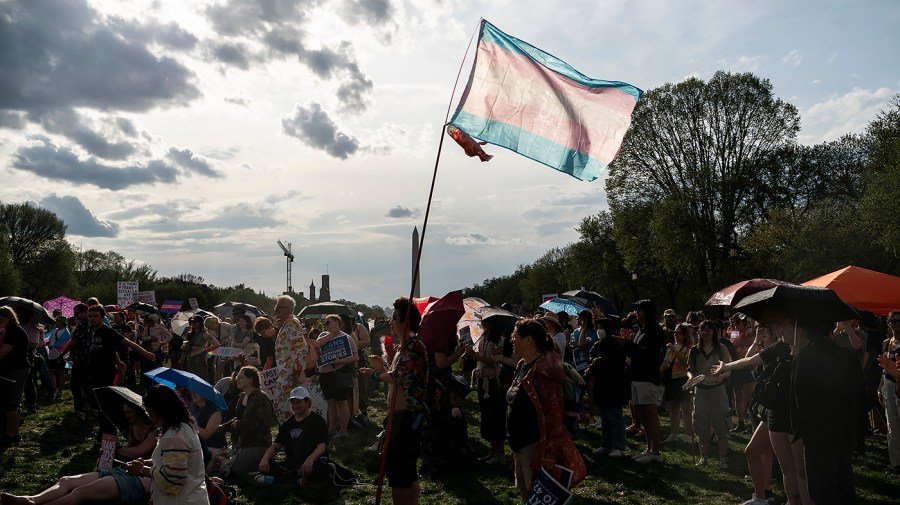
The Supreme Court on Wednesday delivered a substantial blow to transgender-rights advocates in upholding a 2023 Tennessee law banning gender-affirming care for minors, a decision that could have far-reaching consequences for the future of transgender health in the U.S. but whose impact won’t be felt right away.
“The immediate outcome is that it doesn’t change anything,” said Kellan Baker, executive director of the Institute for Health Research and Policy at Whitman-Walker, a Washington-based nonprofit. “It doesn’t affect the availability or legality of care in states that do not have bans, and it simply says that states that have decided to ban this care can do so if they survive other challenges.”
Twenty-seven Republican-led states since 2021 have adopted laws that ban transition-related care, including puberty blockers, hormone therapy and rare surgeries for minors. Laws passed in Arizona and New Hampshire — the first Northeastern state to have restricted gender dysphoria treatments for youth — only prohibit minors from accessing surgeries, a provision that was not at issue before the Supreme Court.
In a 6-3 decision, the high court upheld a lower court ruling that found Tennessee’s restrictions do not violate the U.S. Constitution’s Equal Protection Clause. The state’s law, which allows cisgender children and teens to access medications that it bans for trans minors, makes distinctions based on age and diagnosis, the courts ruled, rather than sex and transgender status.
Three Tennessee families, a doctor and the Biden administration, along with attorneys at the American Civil Liberties Union (ACLU) and Lambda Legal, argued the measure amounts to illegal sex discrimination, warranting heightened review.
“Having concluded it does not,” Chief Justice John Roberts wrote for the majority on Wednesday, “we leave questions regarding its policy to the people, their elected representatives, and the democratic process.”
At least 10 legal challenges to state laws prohibiting health professionals from administering gender-affirming care to minors argue the restrictions discriminate based on sex in violation of the 14th Amendment’s Equal Protection Clause. The Supreme Court’s ruling Wednesday could potentially weaken, in some cases, that line of attack, but it is not the only approach opponents of the laws have pursued.
More than a dozen other lawsuits, including ones arguing equal protection under the U.S. Constitution, claim bans on transition-related health care for minors violate the 14th Amendment’s Due Process Clause, federal disability law or provisions of a state’s constitution. In May, a federal judge struck Montana’s ban on gender-affirming care for youth on grounds it violated privacy, equal protection and free speech rights guaranteed by its constitution.
“This ruling allows challenges to other state bans to continue,” said Baker, of Whitman-Walker, “and they will.”
Karen Loewy, senior counsel and director of Lambda Legal’s constitutional law practice, told reporters on a Zoom call following Wednesday’s ruling that the civil rights organization and others challenging state bans on gender-affirming care have other options at their disposal.
“The Supreme Court did not endorse the entirety of the lower court’s ruling; it did not mandate or even greenlight other bans on gender-affirming medical care, even for young people, or other forms of discrimination,” she said. “It really is about how it viewed Tennessee’s in this specific way, and left us plenty of tools to fight other bans on health care and other discriminatory actions that target transgender people, including other equal protection arguments about transgender status discrimination, about the animus-based targeting of trans people.”
Loewy added that the court’s ruling also left the door open to arguments based on state and federal sex discrimination statutes and parental rights, which the justices did not address Wednesday.
Nearly all of the cases brought against youth gender-affirming care bans argue those laws infringe on the rights of parents to make medical decisions on behalf of their children.
“As a parent, I know my child better than any government official ever will,” Samantha Williams, the mother of L.W., a transgender teenager who was at the center of the case before the Supreme Court, wrote in a New York Times op-ed after Wednesday’s ruling.
The Supreme Court’s determination that Tennessee’s law does not discriminate based on sex also raises questions about how opponents of transition-related health care for minors will use the ruling to inform their own legal strategies.
In Arkansas, the ACLU successfully argued in 2023 that the first-in-the-nation ban on gender-affirming care for minors violated the U.S. Constitution’s Equal Protection Clause, as well as its Due Process Clause and the First Amendment’s protections of free speech.
“We’ll have to see, but it’s possible that that ban could stand because the court made that decision on equal protection, as well as on other grounds,” said Lindsey Dawson, director for LGBTQ health policy at KFF, a nonprofit health policy research, polling and news organization. “This is likely to be an area that’s going to face continued litigation and is not settled at this point in time.”
In a statement Wednesday, Arkansas Attorney General Tim Griffin (R) said he is “preparing an official notification” for an appeals court detailing the implications of Wednesday’s Supreme Court decision on the state’s ban, which the Legislature passed — and former Republican Gov. Asa Hutchinson initially vetoed — in 2021.
“Because our law is similar to Tennessee’s law, today’s decision has positive implications for our case before the United States Court of Appeals for the Eighth Circuit,” he said.
Montana and Arkansas are the only states whose bans on gender-affirming care for youth remain blocked by court orders, according to the Movement Advancement Project, a nonprofit group that tracks LGBTQ laws.
The Supreme Court’s ruling Wednesday also declined, as some court watchers had anticipated, to apply the reasoning of its earlier decision in Bostock v. Clayton County, which held that Title VII of the Civil Rights Act of 1964 shields employees from discrimination based on their sex or gender identity.
Some lawsuits challenging state bans on care for minors have said the ruling should apply to contexts other than workplace discrimination. Former President Biden’s administration similarly sought to use the court’s reasoning in Bostock to back new nondiscrimination policies protecting transgender people in health care and sports, arguments largely rejected by conservative political leaders and courts.
“We still don’t have a sole understanding of where Bostock might apply outside of Title VII, and it’s going to be something that’s important to watch,” Dawson said.
“It’s certainly something that the Bostock court warned us about,” she said. “In that decision, the court said, this court is making its ruling and it’s quite narrow, but it’s going to be for future courts to decide how this applies outside of Title VII. That remains a question mark.”


